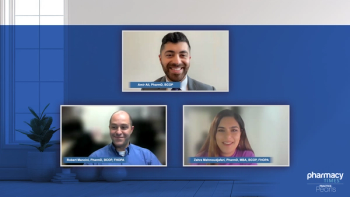
Robert Mancini, PharmD, discusses current DLBCL (diffuse large B cell lymphoma) management approaches, relapse rates, frontline, and subsequent therapies, including emerging treatments like bispecific T-cell engagers and monoclonal antibodies.

Robert Mancini, PharmD, discusses current DLBCL (diffuse large B cell lymphoma) management approaches, relapse rates, frontline, and subsequent therapies, including emerging treatments like bispecific T-cell engagers and monoclonal antibodies.

Experts discuss FDA-approved therapies for DLBCL (diffuse large B cell lymphoma) treatment, including formulations, efficacy profiles, administration impact, patient preferences, and institutional implications.

A panel delves into pivotal clinical trials leading to therapies approved for diffuse large B-cell lymphoma (DLBCL) and provide insights on trial design, patient cohorts, response rates, duration, and toxicity profiles highlight efficacy nuances.

Experts explore early outcomes and patient candidacy factors for bispecific antibody therapy in diffuse large B-cell lymphoma (DLBCL) and discuss responses, real-world evidence, trends in patient outcomes, and selection biases.

Experts discuss future directions for understanding the role of bispecific antibodies in diffuse large B-cell lymphoma (DLBCL) treatment paradigms and research possibilities.

Experts discuss limitations and operational strategies for integrating bispecifics in diffuse large B-cell lymphoma (DLBCL) treatment; addressing adverse effects, education, clinical pathways, and collaboration for effective patient care.

Health care experts provide insights into patient education, shared decision-making, and treatment monitoring in diffuse large B-cell lymphoma (DLBCL) therapies, reviewing education strategies and response monitoring.

Panelists explore the challenges, implementations, and decision-making processes surrounding bispecific treatments in diffuse large B-cell lymphoma (DLBCL).

Robert Mancini, PharmD, discusses bispecific therapy advancements and strategies to manage adverse effects in diffuse large B-cell lymphoma (DLBCL) care, offering insights on toxicity phases, monitoring, and patient care.

Zahra Mahmoudjafari, PharmD, MBA, BCOP, FHOPA, and Amir Ali, PharmD, BCOP, FHOPA, delve into bispecific antibody treatments, focusing on strategies for patient safety and optimizing care in the management of cytokine release syndrome and immune effector cell–associated neurotoxicity syndrome.

Robert Mancini, PharmD, reviews pharmacists’ pivotal role in operationalizing use of bispecifics in diffuse large B-cell lymphoma (DLBCL), overcoming challenges, and supporting direct patient care teams.

Experts discuss strategies to reduce treatment-related toxicities in bispecific antibody treatments, emphasizing clarity on dosing, hydration, and safety concerns.

A panel of experts examines unmet needs in the adoption of bispecific antibody therapy, emphasizing the importance of access and education for diverse stakeholders in oncology care to improve patient outcomes.

Experts provide practical guidelines and key takeaways for health care professionals and policymakers on the implementation of bispecific antibodies in DLBCL (diffuse large B cell lymphoma), emphasizing safety, efficacy, and operational strategies.